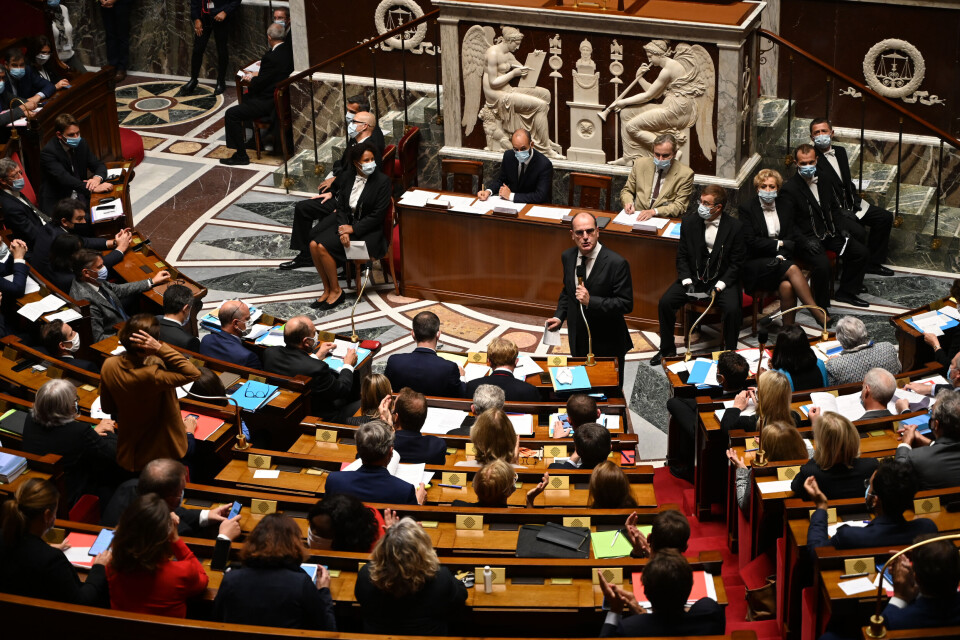-
How many Americans live in Paris - and where else are they choosing in France?
Over a quarter of all US nationals in France live in the capital city
-
Price rises for Netflix in France
The Standard (with ads) and Premium packages are increasing by €24 a year
-
Leclerc supermarkets to sell car fuel at cost price for Easter
The initiative will apply to diesel, petrol, and LPG
Legislative elections: what are the roles and duties of French MPs?
From proposing amendments for parliamentary bills to being present in their constituencies, députés exercise several functions

French citizens will go to the polls on June 12 and June 19 to vote for MPs (députés) to represent their constituencies in Parliament.
French people living abroad have already voted in the first round, which was held last weekend (June 4-5) for them.
Read more: Macron’s party leads as French citizens living abroad vote for MPs
Some 577 députés sit in France’s Assemblée nationale, the equivalent of the UK House of Commons.
We take a look at the roles and responsibilities that French MPs are expected to fulfil.
Representing the nation
Article 3 of the French Constitution states that: “national sovereignty belongs to the people, who exercise it through their representatives.”
Voting on parliamentary bills
Députés are responsible for scrutinising the legislative bills that the government puts forward, and can also propose their own.
French MPs are therefore charged with debating proposed laws in the Assemblée nationale, and then voting to approve or reject them.
Before bills even come to be debated, they are examined by the permanent parliamentary commission which specialises in the policy field in question.
There are eight of these permanent commissions, covering: cultural affairs, education, economic affairs, foreign affairs, social affairs, national defence and the Armed Forces, sustainable development, finance and budget and constitutional laws.
Every MP must belong to at least one of these committees, where they can propose amendments to bills. This can also be done during the parliamentary debate.
Some bills can undergo thousands of amendments, the record being held by a 2006 law on the privatisation of Gaz de France, which had 137,449 changes made to it.
After a bill has been adopted by Parliament, it can be referred to the Conseil constitutionnel by the presidents of the Assemblée nationale and the Senate or a group of 60 MPs. France’s highest constitutional authority will then examine the text to make sure that it aligns with the Constitution.
Holding the government to account
MPs are expected to question ministers on their activities and policies, in order to ensure that the government is working efficiently and fairly for constituents.
This question time is held weekly and televised.
MPs can also participate in specific investigative committees examining certain aspects of government policy.
The Assemblée nationale’s finance commission also has the power to launch investigations into government spending and budget.
Vote of no confidence
Just like MPs in the UK – who carried out a confidence vote with regards to Prime Minister Boris Johnson’s involvement in ‘partygate’ yesterday (June 6) – French députés have the power to call a vote of no confidence in their government.
This vote can be in relation to any issue, but will only be enacted if at least one tenth of Assemblée nationale members ask for it.
If an absolute majority of MPs – 289 or more – vote in favour of the no confidence motion, the prime minister must tender the government’s resignation to the president.
This has only happened once during the Fifth Republic - in 1962.
The president can also be impeached for willfully violating national laws or the Constitution, and this process – called destitution – can be initiated by a group of MPs from the Assemblée nationale.
Being present in constituencies
Although MPs are representatives of the nation, they are also more specifically the representatives of people in their constituencies, and must maintain strong links with those who elected them.
Constituents should be able to contact their député and share with them their ideas and concerns.
How much do French MPs earn?
French députés earn €5,679.71 net per month, including accommodation expenses. They can also access up to €5,373 per month for other expenses not covered by the administration, as long as they can produce proof of the price of a business-directed plane journey or hotel stay, for example.
This salary has not changed since 2012 and represented around 0.15% of the state budget in 2020, or €8 for each French taxpayer.
Députés have not always been paid like this, and from 1815 to 1848, did not receive any wages at all.
MPs’ “allowance is a guarantee against attempts at corruption. It is the price of independence and of the dignity of the role,” the Assemblée nationale website states.
MPs are required to declare any particular interests, functions, memberships and property that they possess at the beginning of their term. They are not allowed to employ members of their immediate family in their office.
Since 2017, députés have also been prevented from occupying several different offices at once, such as mayor and MP for example. This had previously been a fairly common practice, with 82% of députés having another elected role in 2012.
Finally, since 2012, the amount of money MPs have been allowed to spend on their election campaigns has been capped at €38,000 plus €0.15 for each resident of their constituency.
Every candidate who gains at least 5% of the vote in the first round of an election will have their campaign expenses refunded by the state.
Related articles
Explainer: what is the role of a French president?
Who is in France’s new government? Ministers revealed
Laws, national defence: what is the role of the French prime minister?
























